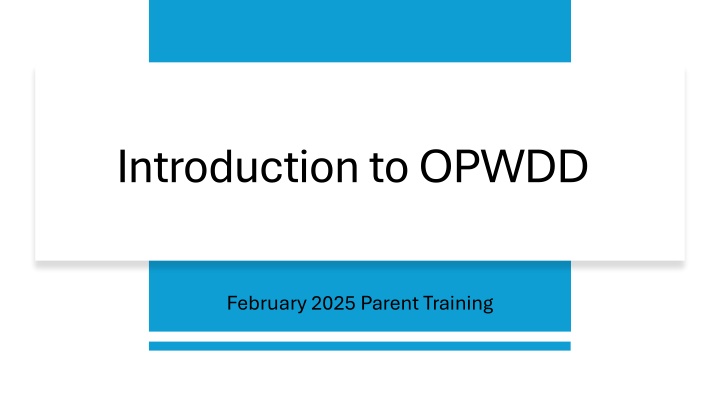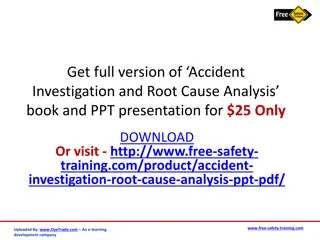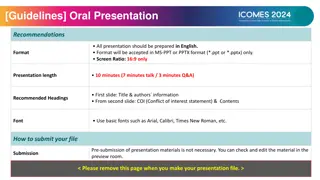
OPWDD Services and Supports for Individuals with Developmental Disabilities
Explore the services provided by the New York State Office for People With Developmental Disabilities (OPWDD) for individuals with developmental disabilities, including eligibility, care management, employment services, and the Front Door process. Learn how OPWDD supports families and empowers individuals to self-direct their services.
Download Presentation

Please find below an Image/Link to download the presentation.
The content on the website is provided AS IS for your information and personal use only. It may not be sold, licensed, or shared on other websites without obtaining consent from the author. If you encounter any issues during the download, it is possible that the publisher has removed the file from their server.
You are allowed to download the files provided on this website for personal or commercial use, subject to the condition that they are used lawfully. All files are the property of their respective owners.
The content on the website is provided AS IS for your information and personal use only. It may not be sold, licensed, or shared on other websites without obtaining consent from the author.
E N D
Presentation Transcript
Introduction to OPWDD February 2025 Parent Training
Agenda What is OPWDD? Getting started The Front Door Process explained Eligibility OPWDD Services Employment Services OPWDD Care Management Assessment
What is OPWDD? The New York State Office for People With Developmental Disabilities (OPWDD) is responsible for coordinating services for New Yorkers with developmental disabilities, including intellectual disabilities, cerebral palsy, Down syndrome, autism spectrum disorders, Prader-Willi syndrome and other neurological impairments. It provides services directly and through a network of approximately 500 nonprofit service providing agencies, with about 80 percent of services provided by the private nonprofits and 20 percent provided by state-run services.
What is OPWDD? Supports and services are provided in community settings across the state and include long-term care services such as habilitation and residential supports. Individuals and their families can also choose to manage their own services and manage their own staff by self directing any or all of their services. OPWDD also provides employment supports, including ongoing job coaching, job matching and vocational training. In addition, OPWDD offers family support services designed to help families provide care for their loved ones who live full-time in their family home.
Structure Five Developmental Disabilities Regional Offices (DDROs) coordinate and oversee not-for profit provider services, and manage the Front Door process. Most of your interaction with OPWDD will be through your local DDRO. You may also interact with not-for-profit agencies funded by OPWDD. OPWDD works in partnership with Care Coordination Organizations (CCOs) to support people in developing and maintaining service plans.
Getting Started
What is the Front Door? The Front Door is how you access services. The Front Door offers a person-centered approach to planning supports for people with developmental disabilities. The Front Door process will guide you through the steps involved in finding out if your child is eligible for services offered by OPWDD, identify their service needs, and help you work on a plan for getting those services. The goal of the Front Door process is to provide supports and services that help individuals and family members in ways that are respectful of their abilities, language and cultural values and traditions.
Eligibility The eligibility review process is the way OPWDD determines if your child has a developmental The eligibility review process is the way OPWDD determines if your child has a developmental disability and are eligible for OPWDD supports and services. disability and are eligible for OPWDD supports and services. The eligibility review process begins at one of OPWDD s five Developmental Disability Regional Offices (DDROs) located throughout New York State. Care Coordination Organizations or Service Access Agencies are available to help you with the eligibility review process by submitting materials and records to the DDRO, such as reports of assessments conducted by medical professionals. Qualified DDRO staff review this information to see if your child s disability meets requirements specified in New York State law. If it meets the requirements, your child is deemed to have a developmental disability and becomes eligible for OPWDD services. (Please note: additional steps, such as enrolling in Medicaid, are needed to gain access to most supports and services.) Depending on the complexity of your child s condition, the process for obtaining an eligibility determination may require reports from multiple specialty assessments. A face-to-face interview may also be part of this process. Eligibility requests and supporting documentation must be sent to the Eligibility Coordinator at the DDRO where you live.
Eligibility Requirements In order for a person to be eligible for OPWDD services, New York State Mental Hygiene Law requires: 1. The presence of a developmental disability that is described by certain qualifying diagnoses or conditions 2. The disability occurred before the person reached age 22 3. The disability can be expected to continue indefinitely or permanently 4. The disability causes a substantial handicap to a person s ability to function normally in society.
Records Needed Records for an OPWDD eligibility review would include: reports of current or recent psychological testing of the person s intellectual functioning a standardized evaluation of the person s adaptive behavior functioning a social/developmental (or psychosocial) history medical reports indicating the person s health status. For children or adults with special medical conditions, genetic disorders, or neurological impairment, medical records that confirm the diagnosis of these conditions or disorders are required. Educational records (the student s Individualized Education Program (IEP) and report cards) can be helpful, too.
Services OPWDD services and supports can help your child live in a home of your choosing, find employment and other meaningful activities, build relationships in the community, and support their health. OPWDD offers an array of supports and services providing different levels of assistance.
Examples of Types of Services Help to live independently in the community with rent subsidies, community habilitation and other services Help for your family to support your child in the family home with respite and family support services Help with employment training and support, volunteer opportunities and other types of community activities you choose Intensive residential and day services, if needed
Employment and Day Services OPWDD values the abilities and talents each person contributes and supports people with developmental disabilities in preparing for working and volunteering in integrated community settings. In addition, OPWDD provides supports and services for individuals so that they can participate in community activities that interest them. Individuals who participate in day services can also participate in employment services.
Prevocational Services OPWDD prevocational services offer people with developmental disabilities an opportunity for career exploration and volunteer experiences to identify their skills, abilities and interests. Pathway to Employment Pathway to Employment is a time-limited service that helps your child develop a plan for employment success using Person-Centered Planning to identify their job interests and goals, try various jobs to determine which tasks and work atmosphere they like best, and learn work-related social and communications skills. The outcome of this service is a Career and Vocational Plan that identifies the next step in their path to employment. You may be eligible for Pathway to Employment if you are receiving day habilitation or community prevocational services, or are a student leaving high school, or someone who is interested in creating a career and vocational plan. Community Prevocational Services: Community Prevocational Services: help people with developmental disabilities learn social and communication skills related to work as well as other work-related skills such as task completion, time management, problem solving, following directions and safety skills that will increase their independence in the community.
Employment Services OPWDD employment services can help people with developmental disabilities obtain and maintain competitive employment. Supported Employment (SEMP) Supported Employment (SEMP) supports people in getting and keeping paid competitive jobs in the community. Once a person-centered career plan is developed through Pathway to Employment, Community Prevocational Services or another method, OPWDD service provider agencies offer job development services. OPWDD service provider agencies also offer services to assist with maintaining employment. These services include helping the individual adapt to the workplace, retraining when job requirements change, and travel training. The Employment Training Program (ETP) The Employment Training Program (ETP) offers people an opportunity to work in a paid internship in a community business. ETP participants receive enhanced job coaching and attend job readiness classes that cover topics like conflict resolution and how to dress for work.
Day Services Community Habilitation (CH): Community Habilitation (CH): helps people who live independently or at home with family learn about and experience community-based activities. Community Habilitation is a service available at home and in the community. It can be either self-directed or agency sponsored. Community Habilitation staff help the person learn and keep the skills they need to live safely and more independently, maintain or improve their health, work toward other personal goals, meet people and make and keep friends, take part in community activities, and be part of their community. Day Habilitation: Day Habilitation: services help people learn and keep the skills they need to live safely and more independently, participate in community activities, identify interests, develop talents and skills, make and keep friends, learn basic life skills, and be a valued member of the community. Day Habilitation activities take place at a set location or within the community Respite Respite services help families who care for their loved ones in the family home, even if the individuals have more serious health issues or more challenging behavioral needs. These services give caregivers needed breaks. The kinds and locations of respite service available include in-home, camp, recreational and site-based.
Family Services Family Support Services help families who care for their loved ones at home. These services can provide Family Support Services help families who care for their loved ones at home. These services can provide needed breaks to caregivers, provide training and moral support, recreational and social activities, sibling needed breaks to caregivers, provide training and moral support, recreational and social activities, sibling services, parent services, parent- -to to- -parent networking and support in times of crisis parent networking and support in times of crisis. . Services include: Respite Family member training Support groups Training in how to manage challenging behaviors Reimbursement Parent-to-parent networking Information and referral Sibling services After-school programs Recreation/social activities
Care Management Care management is the service that helps you and your family get the services and supports your child needs. Care management is provided by Care Managers who work for Care Coordination Organizations (CCOs), organizations that were formed by developmental disability service providers (and are staffed by Care Managers with training and experience in the field of developmental disabilities). Your Care Manager will coordinate a variety of healthcare, wellness and developmental disabilities services to meet your child s needs. Your CCO will help you with the OPWDD eligibility determination process, the Level of Care Eligibility Determination process and the process of enrolling in Medicaid.
Care Management Explanation
Assessment Once your child s eligibility to receive OPWDD services has been determined, you will start the assessment process. The purpose of the assessment is to identify your child s current strengths and needs and the natural or community supports he/she can have or can get. This information is used to plan for services they need and to develop their person- centered plan. Examples include: The Developmental Disabilities Profile (DDP-2) which is a brief assessment used to identify challenges and service needs. The Coordinated Assessment System (CAS) which is a comprehensive tool used to identify strengths, needs and interests, and to assist in person-centered planning.
Transitioning from School to OPWDD Local school districts provide special education services until a student graduates or completes their school program at the end of the school year in which they turn age twenty-one (21). Schools are expected to help plan the student s transition to adult services before their 15th birthday. Families also should begin the process of determining OPWDD eligibility and planning for services ahead of time. OPWDD s Front Door staff, working with Care Managers, will help students at local schools plan for the OPWDD supports they may need as adults.
Contact Information OPWDD toll-free information line: 1-866-946-9733 for questions about supports and services. Front Door Access to Services pamphlet English Spanish Front Door Videos Long Island General Information Number: 631-434-6100.






















